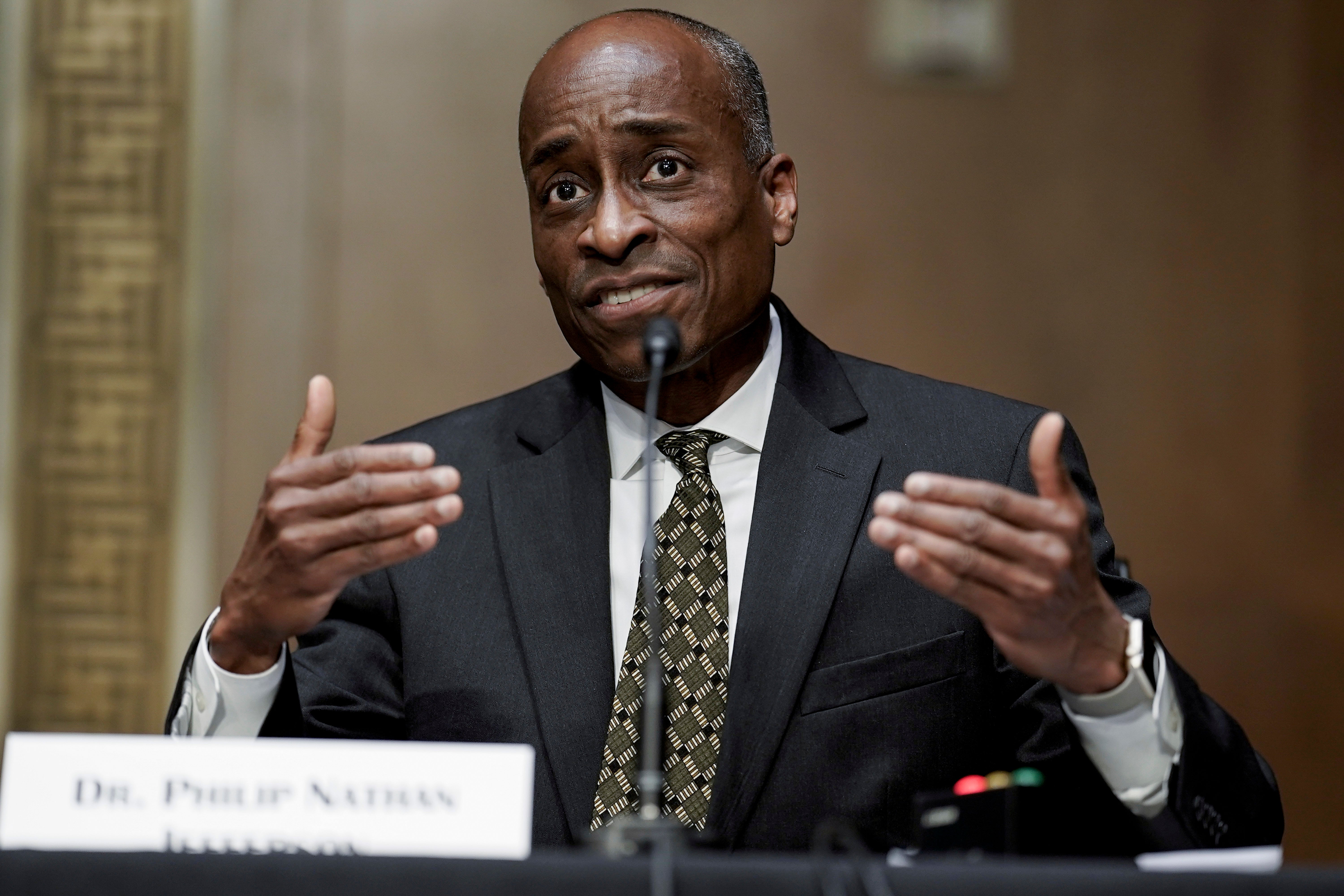Biden's 3 Federal Reserve nominees appear likely to win Senate approval
President Joe Biden’s three nominees for the Federal Reserve’s Board of Governors pledged to fight inflation during a confirmation hearing that drew only modest pushback from Republican members of the Senate Banking Committee

Your support helps us to tell the story
From reproductive rights to climate change to Big Tech, The Independent is on the ground when the story is developing. Whether it's investigating the financials of Elon Musk's pro-Trump PAC or producing our latest documentary, 'The A Word', which shines a light on the American women fighting for reproductive rights, we know how important it is to parse out the facts from the messaging.
At such a critical moment in US history, we need reporters on the ground. Your donation allows us to keep sending journalists to speak to both sides of the story.
The Independent is trusted by Americans across the entire political spectrum. And unlike many other quality news outlets, we choose not to lock Americans out of our reporting and analysis with paywalls. We believe quality journalism should be available to everyone, paid for by those who can afford it.
Your support makes all the difference.President Joe Biden's three nominees for the Federal Reserve's Board of Governors pledged to fight inflation during a confirmation hearing Wednesday that drew only modest pushback from Republican members of the Senate Banking Committee.
Last month, Biden nominated Adriana Kugler, a Georgetown University economist, to serve as a Fed governor, a position that would make her the first Latina to serve on the board in the Fed's 110-year history.
He also nominated Philip Jefferson, who joined the board last year, for the spot of vice chair, which was vacated by Lael Brainard when she became a top economic adviser to Biden. Jefferson, who was a top administrator at Davidson College before being nominated by Biden, holds a Ph.D. in economics from the University of Virginia.
Also in May, Biden nominated Lisa Cook to serve a full 14-year term on the board. Cook joined the board last year along with Jefferson, but only to serve out the final year of her predecessor's full term.
Last year, Cook drew concerted opposition from Senate Republicans and was confirmed by the slimmest of margins, 51-50, with Vice President Kamala Harris casting a tie-breaking vote. At the time, several Republicans asserted that Cook, a Michigan State University economist with a Ph.D. from the University of California, Berkeley, wasn't sufficiently committed to fighting inflation.
Yet on Wednesday, even senators who challenged Cook on some of her previous statements, including J.D. Vance, a Republican from Ohio, acknowledged that she would likely be confirmed.
Vance said he believed Cook’s focus on the importance of diversity at Wall Street banks — based on comments she made in 2019, before she joined the Fed — could “distract” the central bank from its broader bank supervisory work.
On Wednesday, Cook stressed her belief that “elevated inflation is a grave threat” and noted that she has backed the Fed's 10 consecutive interest rate hikes, which are intended to slow the pace of price increases.
Democrats hold the majority on the committee and in the full Senate, making it highly likely that all three nominees will be approved.
Sen. Robert Menendez, a New Jersey Democrat who had vocally pushed the Biden administration to choose a Hispanic to serve on the Fed’s interest rate-setting committee for the first time ever, called Kugler’s selection “history in real time.”
Kugler, whose background is in international and labor economics, has been on leave from Georgetown to serve as the United States’ representative on the board of the World Bank. During the Obama administration, she was the Labor Department’s chief economist, from September 2011 to January 2013.
“As a first generation American and daughter of Colombian immigrants, I am fortunate to have lived the American dream after having seen poverty and adversity,” Kugler, who, like Cook, holds a Ph.D. from the University of California, Berkeley, told the committee.
She also suggested that "high inflation hurts workers and businesses alike," and added that “it is important to bring inflation down to the Fed’s 2% percent target.”
At a separate hearing Wednesday, Fed Chair Jerome Powell told members of a House committee that inflation — which is now 4.4%, according to the Fed's preferred measure — is still too high and will likely require more interest rate hikes to fully defeat.
___
Sweet reported from New York.